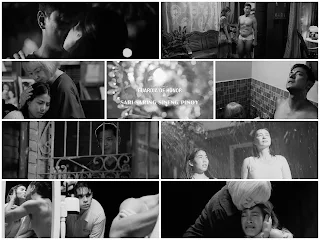Kung Kasalanan Man (Viva Films, 1989) is a movie where morality is grey and whether a character is likable is beside the point. But almost immediately, the film makes it clear whom we’re supposed to be a little more sympathetic. Should our loyalties be with Irma (Dina Bonnevie) or should they be with Jo, the impostor (also played by Bonnevie)? Soap operas tend to feel a bit off the rails — like they’re continuously improvising crazy developments in the plot to maintain our interest regardless of quality.
Kung Kasalanan Man, in contrast, has twists that feel satisfactorily purposeful when they materialize, it’s like they’re falling into place. There is something good about Jo (Timmy Cruz) that is ultimately not so good. She can’t seem to be satisfied. She wants, she lacks. There’s an underlying resentment of what her best friend possesses. But in not recognizing, acknowledging what she has, Jo throws away all that’s worth having. A little bit into the movie, Jo is mistaken by
Aling Miding (Vangie Labalan), one of Irma’s housemaids — an innocuous blunder that becomes an inciting incident. It plants a wicked idea in Jo’s head. Through reconstructive plastic surgery she became Irma and thus rid herself of all her woes. This scheme is so overwrought that, from a distance, it sounds like a dark joke — a satirization of how far a soap opera might go to get its audience agog. The plot sticks close to her and doesn’t stray to extraneous characters. We see her machinations of deceit up close and personal, but Bonnevie plays Jo’s desperation with enough pain to take her seriously: her emotional yearning for a life better than her own, though not resulting in excusable action, resonates. We’re not alienated because we can fundamentally understand her mode of thinking; for the less empathetic viewer,
Kung Kasalanan Man at least establishes enough interest so that we can’t help but want to compulsively watch to find out how long Jo can keep up the charade.
After deciding that the one thing in her life she cares about — her boyfriend, Dan (Tonton Gutierrez) — still isn’t enough to reconsider the potential pitfalls of this outré scheme, Jo succeeds. She isn’t able to exult in the material joys of being Irma for very long. In the guise of her best friend she discovers just how much Dan loved her and this confirmation of a passion she’d taken for granted eats at her. Then we discover that she was jilted and beaten to a pulp by her lover, the sleazy Alvaro (Julio Diaz). Many melodramas find their principal characters saddled with hardship despite not necessarily doing anything wrong, which only makes them more sympathetic. Jo, by comparison, is like a spider who has gotten trapped in her own web. She would have been fine had she not spun anything in the first place. Bonnevie is sensational in both roles; when the camera rests on her face in close-up during a particularly emotive moment, there’s a floridness to her performance, but that’s part of what makes the movie so magnetic — Bonnevie knows how to complement the excesses of the plot. She’s adept at achieving emotional believability that also looks beautiful when played for the camera. As Irma she is bland, wistful, introverted—the sort of character she usually plays when put upon. As Jo, she swaggers, talks boldly and generally behaves toward herself—or she toward others. The direct juxtaposition of Bonnevie's two familiar types of roles, with herself—expertly photographed, incidentally—playing both of them, inclines to disconcert. The trick is too patent to be illusory, the situation too theatrically contrived. Gutierrez is agreeable as the object of both women's love and selfishness, though he is never any more than just an object, while Diaz registers masculine adulation. Eddie Garcia directing stylishly, shrewdly uses mirrors to remind Jo of all the deceit she has wrought. They’re like tangible manifestations of her inner consciousness and what she has done after a successful duplicity has put an arrogance in her step. There’s an otherworldly eeriness to the film’s menace, with its flouted ideas of an evil other around to seize one’s life, this feels ingeniously addressed by Jaime Fabregas' musical score. Garcia is bold enough to enlist the viewer on Jo’s side. Not, perhaps, in overt complicity, but rather in a deep-rooted emotional identification with her longing for a better life. Kung Kasalanan Man takes a darker and more jaded view of morality. Melodrama is a critical instrument of a society that has created it to show its desires, limitations and longings.
Production Design: Manny B. Morfe
Cinematography: Joe Batac, Jr., F.S.C.
Sound Supervision: Rolly Ruta
Film Editor: Ike Jarlego, Jr.
Musical Director: Jaime Fabregas
Screenplay: Amado Lacuesta, Jr., Raquel Villavicencio
Directed By: Eddie Garcia










